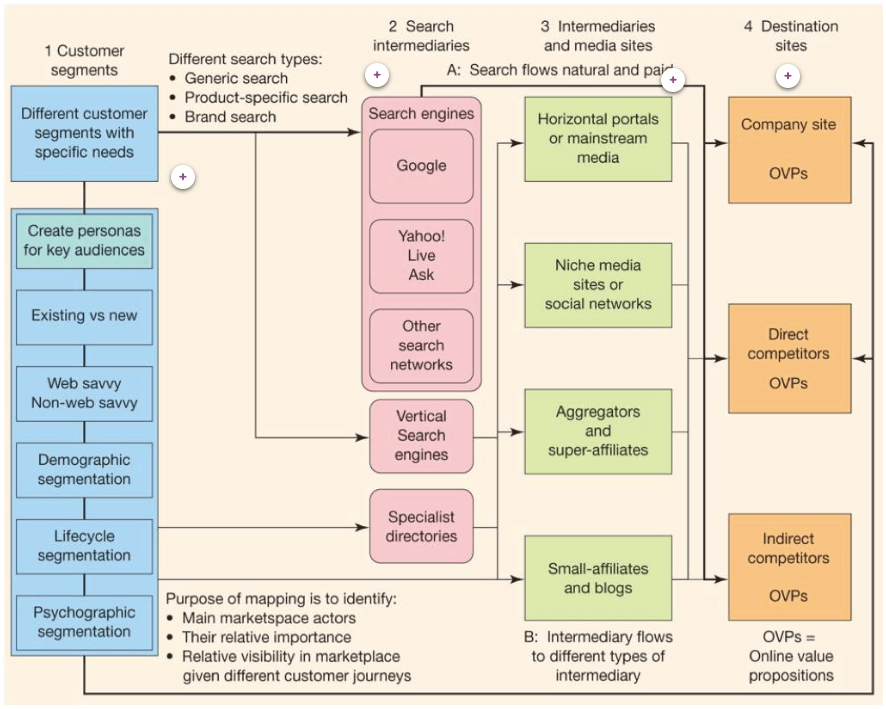Essentials of a multichannel marketing plan
Multichannel marketing (Omnichannel marketing) is utilizing online and offline marketing communications channels for targeting and engaging customers for repeated sales.
Purpose:
• To empower marketers to plan, manage and optimize their resources to achieve sales goals in a time bound manner.
• Timeframe can be annual or potentially longer-term of five years also.
Goal:
• To generate leads and to achieve sales targets for products and services.
Approach:
• Both communication techniques and channels are important for effective omnichannel marketing.
• It strategically connects multiple channels into one, thriving, multi-channel communications approach.
• Communications channels could include websites, blogging, E-mail marketing, catalogues, text messaging, TV, physical stores etc.
Applicable to
• Whole market for single product or service.
• Single market for single product or service categories.
Whizzystackian plan, manage and optimize your multichannel marketing strategies for their clients. With bespoke options for small and large businesses alike, we have marketing solutions to help achieve their goals. Find out how to create your winning marketing strategy today.
When to use it?
A multichannel marketing plan sets out campaigns spanning multiple channels and cater to the specific segment of customers.
As the customer controls the buying process a multichannel marketing plan should therefore continually engage, nurture, and retarget customers to convert to a sale. A multichannel marketing will be ‘always-on’ in nature and will reach customers through channels of their choice either the inbound or outbound.
Integration is key to a successful multichannel marketing plan. For example, a digital marketing plan should be used to inform all your omnichannel activities. This type of integration will continuously make organizations stand out and will help to gain qualified leads, and maximize conversion throughout the customer lifecycle.
Multichannel marketing plan
A multichannel marketing plan typically includes:
• SMART objectives for customer acquisition and retention.
• Detailed customer profiles
• Customer focussed marketing communication channels.
• Details of relevant multiple platforms and devices
• Marketing tactics including content marketing.
• Results Assessment for effectiveness, influence, and exclusion
Accurate assessment will help you to know the combination of channels and campaigns that derives maximum sales. It will also ensure future success of activities and the return on investment (ROI) for that particular channel.
Customers move quickly across channels therefore both strategy and analytics should be simultaneously adapted.
Error! Filename not specified.

Plan a new approach to digital Marketing
Do you need a marketing plan to deliver ROI based digital marketing? We are marketing professionals to support you to accelerate your results through streamlined, effective, multichannel marketing.
Book your free 1-2-1 strategy consultation to find out more.
Perfect Multichannel Marketing Plan Structure
For the perfect multichannel plan structure, we need a framework that gives a structure to plan, manage and optimize the many activities in the modern marketing funnel. A framework must be helpful for structuring business, marketing, or digital marketing plans, should be relatively simple and easy to remember and to explain. Few important components of a Framework are :
Situation Analysis, Objectives, Strategy and Tactics.
Situation Analysis tells the present situation of our multi-channel marketing. A few important questions that can be included in Situation Analysis:
• Accurate measure of results through analytics.
• Types of prospects for online targeting.
• Competitors Analysis.
• Success factor for Competitors.
Objectives mean the final situation where we want to be :
• Quantified Business objectives against timescales.
• Top-level goals.
• Growth forecast.
• Specific leads and sales forecasts by channel.
Strategy summarizes and sets the direction on how to achieve strategic goals and objectives. It is the shortest and most important part of the plan; it answers questions including:
• Match of targeted segments and propositions.
• Positioning
• How to achieve leads and sales targets.
• Communication channels and other media investments.
• Communication strategies to support customer acquisition, conversion, and retention.
Tactics are the details of strategy and how to use tactic tools to implement strategy. The marketing mix, communications mix, and channel mix are few of the tactical tools.
A Successful Framework for Digital Strategy ?
There is an initial phase of Plan involving creating the overall digital strategy, objective setting, and plan. The primary four online marketing activities designed to help brands engage their customers throughout the customer lifecycle are Reach, Act, Convert and Engage.
• Reach: Reach is building brand awareness, brand visibility, products and services visibility through online and in offline channels. The result will be increased traffic to different web presences i.e., website, microsites or social channels. It involves maximizing reach to create multiple interactions over time using different touchpoints.
• Act: Act is short for Interact. While Reach is to increase traffic on online channels, Act encourages interactions and persuades prospects to take the next step or next action on their customer journey on these channels. It may include searching for more information about the company, its products, reading a blog post or signing up for a newsletter. The Act is also about encouraging participation. Participation can be content sharing via social media or customer reviews.
• Convert: It is simply conversion to sale through online or offline medium. It involves making website visitors take vital steps to make payment through online eCommerce transactions or offline channels.
• Engage: This is a long-term customer engagement and communications to build a long-lasting relationship and a higher customer loyalty resulting in repeated sales and higher customer lifetime value. Communication can be through corporate websites, social channels, email and can be a direct interaction. Engagement Measures are repeated actions of sales and social media content shared by customers. We can also measure the percentage of active customers (or email subscribers) and customer satisfaction and recommendation using other systems.
Benefits of Digital Marketing Plan
A solid digital marketing plan has:
• Clear, realistic, achievable strategic goals
• Goal oriented competition-based Strategy
• Tactics and Action Plan to achieve strategic goals.
• Scientific Assessment Methods to check progress
Need a winning marketing strategy?
Book your free 1-2-1 consultation to develop your new strategy
Which type of business is a Multichannel Marketing most suited for ?
Suitability of multichannel marketing plans depends on the business and communication channels used in marketing by the organization. It can be used as:
• An annual communications plan for SME/SMB (Small/Medium businesses)
• An annual communications plan for one market or audience for larger businesses.
• longer-term customer engagement plan for a particular market or audience.
Challenges in implementing an omnichannel marketing planning in large organizations
The prime challenges are due to frustrated efforts to:
• Centralize goals
• Achieve coherent customer relationship management (CRM)
• Coordination issues in messaging across departments, brands and business units
• Achieve consistency across channels
• Measure frequency and reach of activities
How does a multichannel marketing plan relate to other plans?
Multichannel marketing plans are confused with a broader marketing plan how in reality it is a marketing communications plan
Key outputs for a Multi-Channel Marketing Plan:
• Marketing objectives
• Marketing budget
• Campaign plans
• Resource plans
A multichannel marketing plan can be integrated with a marketing plan, a digital marketing plan, and a campaign plan. An effective integration and compilation will result in a strategic, multi-channel approach to inbound marketing.
Further integration to organizational plans can result in a long-term integrated communications plan for utilizing all marketing activities together to hit lead and sales targets.








